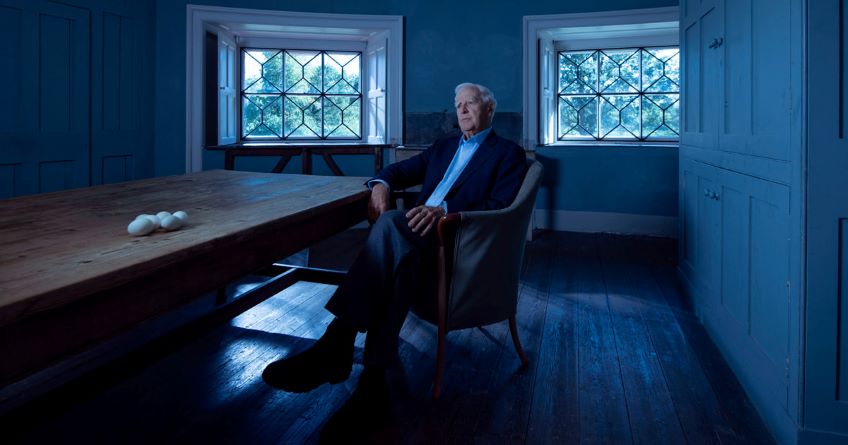Joyce Glasser reviews The Pigeon Tunnel (October 20, 2023) Cert 12A, 92 mins. On Apple TV Plus
For about five decades of David Cornwell’s stellar career as a spy novelist, writing under his better-known pen name John le Carré, the mystery behind the man made the novels all the more authentic and imbued with the romance of danger. With dribbles of biographical information we heard that Cornwell worked for MI5 and MI6, and that his career as a spy was cut short by Kim Philby naming him to the KGB.
Since Adam Sisman’s 2015 painstakingly researched biography, attempts to separate the mythology of the man from the facts have accelerated. Sisman’s biography was followed by Cornwell’s own biographical memoir The Pigeon Tunnel: Stories from My Life. Now, the celebrated documentary film maker, and supreme interviewer Errol Morris (The Known Unknown, The Fog of War: Eleven Lessons from the Life of Robert S. McNamara, The Thin Blue Line) enters the field with The Pigeon Tunnel, a final, “candid interview” with Cornwell. This might be the final interview (Cornwell died in 2020 and his widow shortly after), but it’s not the final story. With Morris’s film comes Sisman’s The Secret Life of John le Carré containing information which he was contractually unable to include in the 2015 biography.
The problem is not whether the late Cornwell’s sons, Simon and Stephen, who are producers of the film, would allow a candid interview, but whether David Cornwell is capable of giving one. Is even Errol Morris a match for this master of smoke and mirrors, whose careers in Intelligence and as a novelist depend on deceit? Even the title of his memoir, The Pigeon Tunnel: Stories from my Life is part metaphorical, part autobiographical and qualified by the use of the ambiguous word “stories.” Stories can be true, mythical or otherwise imaginary.
As for the autobiographical part, Cornwell recalls that as a boy his father, Ronnie, would take him to Monaco where wealthy gamblers shot pigeons over the Mediterranean, but, like big game hunting, it’s not a level playing field. The pigeons were bred on the roof and then forced through a tunnel to the shore, where their first glimpse of freedom would be their execution. The minute they flew out toward the blue sea they would be shot by the guns waiting for them. For anyone who has read le Carré, this childhood memory is a convenient metaphor, among other things, the spy game in which the odds are rigged against those in the murky world of Intelligence.
Morris pioneered the use of the Interrotron to provide a more intimate, intense and personal experience for the interviewee. The interview subject looks at the camera and sees, as with a teleprompter, not words, but the interviewer’s face. We see the subject looking at us. In The Pigeon Tunnel, the interview is intercut with clips from films and dramatised re-enactments with a cast of actors and music by Philip Glass.
This meeting of minds between two extremely creative men, Morris and Cornwell/le Carré is focused on unravelling the creative process more than dispelling myths, getting to the truth behind the fiction. But despite Morris’s experience and expertise, one senses that Cornwell and not Morris is in control of the material, a feeling that is both revealing and frustrating.
Cornwell’s responses are not really answers to questions, but commentaries on the creative process that sound rehearsed. There is not an “um” or pause or an inelegant phrase. Could Cornwell ask for another take or had he memorised his script?
Cornwell sounds entirely genuine when discussing his family, although, here, too, he has thought so much about it, analysed it and written about it to such an extent that the emotion is contained. Cornwell’s childhood and his adult relationship with his conman father, Ronnie, are at the heart of his professional life, both as a spy – a person who deceives others – and a novelist. He writes about men who deceive others and withhold the truth from the reader as and when he sees fit.
Born in Poole in 1931 to Ronald Thomas Archibald Cornwell and Olive Moore Cornwell (nee Glassey), David had an older brother and two younger half-siblings whom we hear little about. His mother left the family home when he was five. Beside starving him of affection, this was a betrayal, one that might be responsible for his many affairs, all of which he ended, according to Adam Sisman’s revelatory new book. These affairs, about one per novel, are not touched on in the interview.
As an adult Cornwell could perhaps understand his mother’s desperation. Ronnie was a brute and if he beat up his son he might well have been an abusive husband. Jailed for insurance fraud and continually in debt, life was insecure, with Ronnie living like a king one minute and an impoverished fugitive another. Cornwell describes being bundled in the car boot with possessions on the run from the bailiffs and says, ‘I’ve been on the run ever since.’ He has amassed a few homes to run to.
For novelist le Carré, this childhood was a gold mine. In A Perfect Spy the father of Magnus Pym is Rick Pym, described as a schemer and conman, and clearly modelled after Ronnie. In 1975 when Ronnie died, David paid for the funeral but did not attend. When Magnus Pym returns to England to attend his father’s funeral in the novel he disappears.
But when it comes to the women in le Carré’s output (his weakest characters), the interview is fairly silent. What about that key line in The Russia House (1989) when protagonist Barley Blair says, ‘I bewitch people, then the moment they’re under my spell, I cease to feel anything for them.’ For a spy or handler, that’s a gift, but in a man’s private life it’s a curse to the man and a cruel blow to the woman.
Somehow, despite this dysfunctional family upbringing, and with some interruptions, David went to Oxford, not to study law as his father thought, but modern languages, a decision that made him – along with his ambiguous feelings of loyalty – an ideal candidate for MI5. Unlike Ian Fleming, however, who new research reveals to have been at the centre of Churchill’s inner circle and a key player in the espionage business, Cornwell’s role was on a lower level. A line from A Perfect Spy, seems to apply to Cornwell/le Carré: ‘All his life he’s been inventing versions of himself that are untrue.’
Cornwell tells Morris that ‘without the creative life, I have very little identity, like an actor without a role.’ And that’s the problem with this documentary. We are hearing from a brilliant author whose identity is so embedded in his writing that, unlike Robert McNamara, there is no further identity, or truth, to be revealed.




